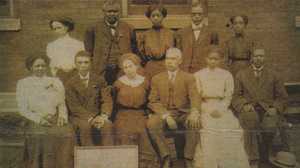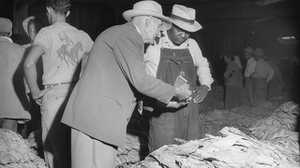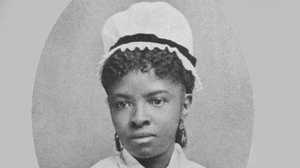Pearl High School Memories
Memories
Teachers and students at Pearl High made the most of the limited resources available to them. Teachers' high expectations for student achievement were boosted by their close ties to parents. "You had the church, the home, and the school, explained Alice Epperson, class of 1962. "You were encouraged to do your very best, and if you didn't, somebody knew.
With few teaching aids, teachers had to use creativity and enthusiasm to hold students' interest. Their dedication paid off. "I can remember Reverend Ewing spending his summers with math sessions," Epperson recalled, "and Ms. Holland doing chemistry in the summer without pay. They were interested in encouraging the students to do as much as possible."
Explore the memories of four people from the Pearl High School community.
Alice Epperso, Class of 1962
Ambition: Pharmacist
Activities: Math Club, Sub Deb Social Club, Spanish Club, N.A.A.C.P.
After graduating from Pearl, Alice Epperson attended Florida A & M University, where she obtained a Bachelor of Science degree in pharmacy. For more than twenty years, she has worked for Roche Laboratories as a pharmaceutical representative for the Nashville area.
The school was the nucleus of a three-fold organization within the community. You had the church, the home, and the school. Attending the school was also representative of seeing the same people in church and in the neighborhoods as well. So it was a family-oriented thing. You were encouraged to do your very best and if you didn't, somebody knew. I remember entering the school, and Mr. Hull, J.C. Hull, was standing in the foyer and I knew I was wrong. I passed by and he said, "Young lady, are you a Dederick?" And I stopped, and I said, "Yes, how do you know?" And he said, "I know your whole family." It was that kind of atmosphere. You were respectful of your peers and the instructors there did everything they could to encourage you to pursue whatever area you were interested in. The Science department was very strong. The History department, the English department, the whole school was very strong.
The instructors took personal time to add or to enhance our education. I can remember Reverend Ewing spending his summers with math sessions. Ms. Holland doing chemistry, Mr. Harris doing chemistry in the summer without pay. They were that interested in the students to encourage them to do as much as possible. Mrs. E.F. Walker, an English instructor, was very instrumental in encouraging people to write poetry, stories, and participating in a number of contests throughout the city.
Lynda Wynn, Class of 1966:
Activities: Junior Miss Social Club, Las Hermanas Civic & Social Club, Yearbook Staff.
Today, Linda Wynn is a history professor and member of the Tennessee Historical Commission.
Pearl throughout its history within the confines of segregation has been an illustrious school. It has been one of the leaders in the educational landscape. Not only in Nashville, but also throughout the nation. The late former J.C. Hulls said it was one of the first comprehensive high schools in Nashville, and it certainly competed nationally. It was in the realm of schools such as Dunbar in Washington. It was recognized nationally. It had a very dedicated faculty. The students that came out were represented in many fields, ministry, music, religion, law, business, and education. You name it, the graduates of Pearl High School are there.
The following year, when the TSS Double A desegregated, the Pearl High class of '66 went all the way and won the state championship. We had a perfect season, 31-0. Several of the members of that particular class, Perry Wallace for example, went on to sign with Vanderbilt University, becoming the first African-American to play basketball in the SEC. Walt Murray, who was a classmate and also class president, also joined Perry at Vanderbilt, and ultimately became the first African-American to sit on the Board of Trust at Vanderbilt University. Several members of the class of '66 have managed to obtain a 'first' status. That class is very interesting, if you will, because it was right in the middle of the "black revolution." It was right at the time that black power was beginning to come in, we were right there at the '64 signing of the Civil Rights Act, the '65 Civil Rights Act. So we were right in the middle of that black revolution and there is a bond. Our class is together every five years for a class reunion. And we've done that. We just celebrated our thirtieth reunion in June of last year.
When I go back and think about some of the teachers who were there, about those who molded us, for instance, a Minerva Hawkins who was in history and inspired the chair of the civil rights commission, Mary Francis Barry. She inspired me to go into history. When I think about a Mrs. Mary Walker, the late Mary Walker, who was very instrumental in making sure you learned how to write, you learned your grammar, you learned english, you learned literature. Certainly, one cannot forget the principal, Mr. Hull. He, like we said, he knew your family. I can remember walking in and he'd look at me and he'd immediately say, "You're a Colma" And I said, "No, I'm a...." "But your mother was a Colma." He knew. The school, I think, was very instrumental in your growth, not only intellectually, but socially. I think the teachers instilled in you to be politically astute. It was a comprehensive kind of education that went outside the bounds of academics. It prepared you, they prepared you to enter life. Not only just the faculty, but the staff. The janitorial staff. It was a family within a family, so to speak. So, I think the school was very instrumental and sometimes I wonder if the children today are receiving that kind of nourishment from today's educational institutions.
Marcus Gunter, Class of 1935, and later a music teacher at Pearl
Favorite subject: Music
Toughest subject: Latin
Activities: Basketball, Orchestra, Jazz Band
Marcus Gunter was Pearl High School's music teacher and band leader for 39 years. Subsequently, he became a funeral director at William Gunter & Sons Funeral Home and Funeral Directors in Nashville, Tennessee. He especially remembers Pearl for its superb faculty.
Pearl just had many, many top graduates of the people who made the community. It was the only high school, and everybody in those years who was from Nashville were Pearl graduates: the doctors, the lawyers, the ministers, everybody.
The black teachers at Pearl cared. No, we didn't have all the overhanging stuff, but the teachers made a difference because they cared and wanted the students to succeed. Even when I was in high school, I always knew that I was going to college and the teachers tried to prepare me for going to college.
Pearl did not gain anything from desegregation. They lost. The black kids lost their identity and they lost their culture. They don't have good bands. They don't have good programs. So desegregation really didn't do us a favor, really, because the black kids now are not achieving like they did at Pearl with segregation. Those kids went to college, the teachers cared. But now, you can't compare the students of today with the students of Pearl High.
Nat Cripperns:
As a parent of a Pearl High School student and the spouse of a teacher, Nat Crippens experienced the closeness of the school community and witnessed its undeniable school pride. He saw how the students respected and revered the teachers, who challenged them, and he marvels at how close the graduates remain to this day. Mr. Crippens' son, David, was so inspired by his teachers, fueled with discipline and the desire to succeed that he went on to establish his own media consulting firm in Los Angeles.
Pearl occupied a peculiar niche in the whole educational order. It was regarded as a type of pinnacle in the profession. If you graduated from Pearl, you were proud of it. Even after you got subsequent degrees, whenever you would talk about your education, you would start with Pearl High School. Most people don't even mention the high school they attended when they talk about their education. Almost certainly and practically everybody that went to Pearl, that's the first thing that they mention. And some people left university faculties to join Pearl faculty, and were proud of it.
My son is a graduate of Pearl from 40 years ago. And he comes back to reunion from Los Angeles and stays a week. It was the friendships, and they're scattered all over America. There are all kinds of outstanding people who finished Pearl.
One of the reasons that Vivien was able to make it was the thorough training that he had there and the kind of supportive environment. Parents communicated with teachers. Teachers communicated with each other and if Vivien or anyone got out of line, before nightfall the parents knew it. And the parents would tell the child, "I'm not sending you there to do so and so and so. I'm sending you there to learn. And Miss So-and-so is trying to help you."
Long before I ever saw Pearl or came in contact with it in any way, I had heard of Pearl High School. They had a reputation like a major university. It was somewhat similar to the reputation that Dunbar had in Washington D.C. They were highly respected and people who had advanced degrees always mention that they finished Dunbar and that is true in Nashville.







